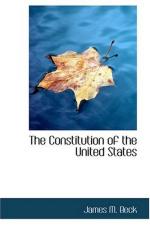“Have you a copy of the French Constitution?” was asked of a bookseller during the second French Empire, and the characteristically witty Gallic reply was: “We do not deal in periodical literature.”
Constitutions, as governmental panaceas, have come and gone; but it can be said of the American Constitution, paraphrasing the noble tribute of Dr. Johnson to the immortal fame of Shakespeare, that the stream of time, which has washed away the dissoluble fabric of many other paper constitutions has left almost untouched its adamantine strength. Excepting the first ten amendments, which were virtually a part of the original charter, only nine others have been adopted in more than one hundred and thirty years.
A constitution, while primarily for the distribution of governmental powers, is, in its last analysis, a formal expression of adherence to that which in modern times has been called the higher law, and which in ancient times was called natural law. The jurisprudence of every nation has, with more or less clearness, recognized the existence of certain primal and fundamental laws which are superior to the laws, statutes, or conventions of living generations. The original use of the term was to import the superiority of the Imperial edict to the laws of the Comitia. All nations have recognized this higher law to a greater or less extent. If we turn to the writings of the most intellectual race in ancient time and possibly in recorded history—the Greeks—we shall see the higher law vindicated with incomparable power in the moral philosophy of its three greatest dramatists, Aeschylus, Sophocles, and Euripides. How was it better expressed than by Antigone when she was asked whether she had transgressed the laws of the state and replied:
“Yes, for that law was not from Zeus, nor did Justice, dweller with the gods below, establish it among men; nor deemed I that thy decree—mere mortal that thou art—could override those unwritten and unfailing mandates, which are not of to-day or yesterday, but ever live and no one knows their birthtide.”
Five centuries later the greatest of the Roman lawyers and orators, Cicero, spoke in the same terms of a higher law, “which was never written and which we are never taught, which we never team by reading, but which was drawn by nature herself.”
The Roman jurists gave it express recognition. They always recognized the distinction between jus civile, or the law of the State, and the jus naturale, or the law of Nature. They nobly conceived that human society was a single unit and that it was governed by a law that was both antecedent and paramount to the law of Rome. Thus, the idea of a higher law transcending the power of a living generation, and therefore eternal as justice itself—became lodged in our system of jurisprudence. Nor was the Common Law wanting in a recognition of a higher law that would curb the power of King or Parliament, for its earlier masters, including four Chief Justices (Coke, Hobart, Holt, and Popham), supported the doctrine, as laid down by Coke, that the judiciary had the power to nullify a law if it were “against common right and reason.”—(Bonham’s Case, 8 Coke Reports, 114.)




